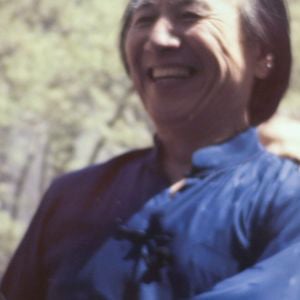 The first time I saw someone practicing tai chi, I had no idea what they were doing. It was sometime in the 70s on the Boston Common, and I thought, “What on earth is that?” In later years I took a keen interest in Asian culture, and learned about martial arts, although I had no interest in studying them at the time.
The first time I saw someone practicing tai chi, I had no idea what they were doing. It was sometime in the 70s on the Boston Common, and I thought, “What on earth is that?” In later years I took a keen interest in Asian culture, and learned about martial arts, although I had no interest in studying them at the time.
Sometime in the early 90s when I was living in New York, I was visiting my step-father George in Connecticut and he was doing some exercises that looked like tai chi. I said, “George, is that tai chi?” And he said, “No, not really, I just made it up.” Well, I thought that was pretty resourceful of him, and I mused, “That looks like fun. Maybe I’ll take some classes.”
So I did. I found Korean teacher and joined a beginner class in Yang form tai chi. It was interesting and fun, but I found that I couldn’t remember the moves. This teacher used to demonstrate them in front of the entire class and we would imitate him—that was it. After awhile, I felt I was making no progress, so I started asking around about other teachers. One of the students in my class asked me if I’d ever heard of Master Chu. I said I hadn’t, and she gave him such a glowing recommendation that I decided to go see him. She had observed one of his classes and had also decided to study with him.
I was surprised the first time I entered Chu’s spotless studio in Times Square to watch a class. The students weren’t all lined up doing the same moves. Instead, they were working individually on different moves, and Master Chu and his assistants would move among them, making corrections. I liked that approach, so I signed up right away.
In the beginner class, Master Chu taught a modified version of the Yang Short form. I joined the class, and it didn’t take long for me to discover that I was remembering the postures easily. Master Chu, a diminutive man dressed in a navy blue silk uniform, would watch the students, then help them with their moves. He was very demanding, but never intimidating. He’d constantly say in his halting English, “Tuck! Tuck”—meaning to pull in our behinds, since most of us had a tendency to stick them out!
I loved Master Chu. He had a wonderful sense of humor, and was always so relaxed…he seemed very comfortable in his own skin. He treated me kindly and always gave me a generous discount on classes, which meant a lot to me. He was genuinely interested in all his students and their progress. I’ve missed those classes since I move to Rio de Janeiro, but I’m glad I have his DVD, because I have never been able to find a tai chi class or teacher here that really suited me. It might be because Master Chu had such a profound influence on me and I can’t seem to enjoy other styles as much as his.
About Master Chu
Grandmaster C.K. Chu (1937-2013) was one of the great tai chi masters of the twentieth century. Born in Hong Kong, Chu was educated in martial arts and calligraphy as a child. He came to New York in the 1960s for college and graduate studies. He earned a masters degree in physics from Queens College and completed graduate work for a Ph.D. (ABD). Chu always said he began teaching Tai Chi to further his own training. His books were among the first books published about tai chi in English. During his 40 years of teaching Taoist arts in Times Square, Master Chu touched thousands of lives for the better.

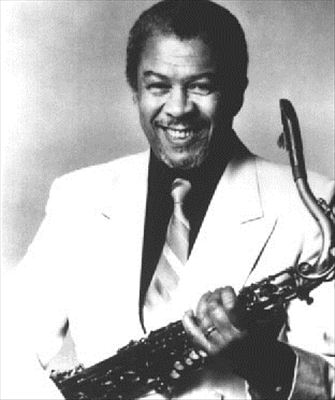 I met saxophonist Frank Foster (known as “Fos”) in the 80s at the Jazz Cultural Theater, a performance space founded by pianist Barry Harris. Harris gave classes there, and there were also classes taught by other musicians, including Frank Foster. I used to spend quite a bit of time hanging out there. I liked the vibe—it was funky and casual, and there were usually a couple of strung out musicians stretched out on the raggedy sofas in the entryway.
I met saxophonist Frank Foster (known as “Fos”) in the 80s at the Jazz Cultural Theater, a performance space founded by pianist Barry Harris. Harris gave classes there, and there were also classes taught by other musicians, including Frank Foster. I used to spend quite a bit of time hanging out there. I liked the vibe—it was funky and casual, and there were usually a couple of strung out musicians stretched out on the raggedy sofas in the entryway.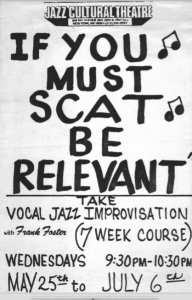 Frank said yes, as a matter of fact, he was starting an arranging course the following week, so I joined up right away. Everything was fine at first, but then new people kept showing up every week and he’d go back to the beginning and start over. Also, he wasn’t teaching how to get the stuff down on paper, so I grabbed him after class and told him that the class wasn’t working for me and what I needed. He said, “Why don’t you come out to my house and I’ll give you a couple of private lessons.” Well, I was thrilled at the thought of that, because then I could have him all to myself and ask him all of my specific questions.
Frank said yes, as a matter of fact, he was starting an arranging course the following week, so I joined up right away. Everything was fine at first, but then new people kept showing up every week and he’d go back to the beginning and start over. Also, he wasn’t teaching how to get the stuff down on paper, so I grabbed him after class and told him that the class wasn’t working for me and what I needed. He said, “Why don’t you come out to my house and I’ll give you a couple of private lessons.” Well, I was thrilled at the thought of that, because then I could have him all to myself and ask him all of my specific questions.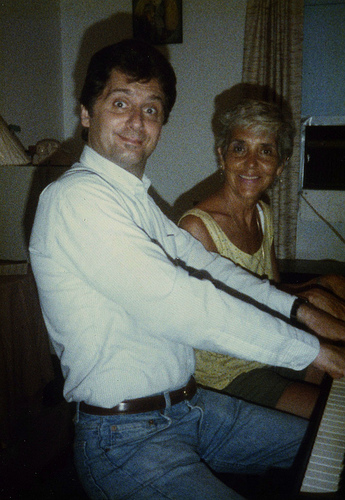
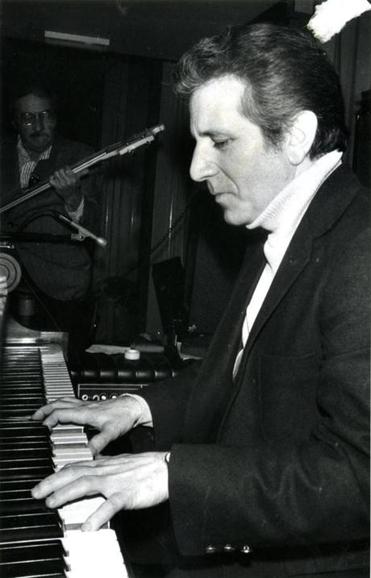 I was living in Boston in the 60s and 70s (except for two years in Brazil in the late 60s). I don’t remember exactly when or how I first met jazz pianist Ray Santisi, although it was probably at what was then known as Berklee School of Music, where he was teaching. I didn’t have the financial wherewithal to enroll, so I would go over there and hang around, hoping to get to know some musicians or find a jam session.
I was living in Boston in the 60s and 70s (except for two years in Brazil in the late 60s). I don’t remember exactly when or how I first met jazz pianist Ray Santisi, although it was probably at what was then known as Berklee School of Music, where he was teaching. I didn’t have the financial wherewithal to enroll, so I would go over there and hang around, hoping to get to know some musicians or find a jam session.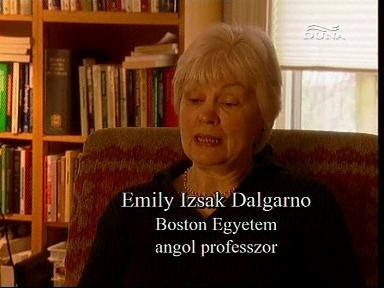 In my previous post, I said that I would write about six teachers who had changed my life. I’m going to do this in chronological order, and this is the first one (the only one still living):
In my previous post, I said that I would write about six teachers who had changed my life. I’m going to do this in chronological order, and this is the first one (the only one still living): Most of us have had at least one teacher in our lives who has left a lasting impression. I’m going to devote my next six blog posts to the teachers I feel really changed my life in a significant way.
Most of us have had at least one teacher in our lives who has left a lasting impression. I’m going to devote my next six blog posts to the teachers I feel really changed my life in a significant way. Scientists, philosophers, religionists, psychologists and even the ordinary man on the street seem, these days, to be more and more willing to openly acknowledge the power of thought. “You are what you think” is becoming even more popular than “you are what you eat,” and at least some people are taking the time to consider the possibility that life is more subjective than they thought it was.
Scientists, philosophers, religionists, psychologists and even the ordinary man on the street seem, these days, to be more and more willing to openly acknowledge the power of thought. “You are what you think” is becoming even more popular than “you are what you eat,” and at least some people are taking the time to consider the possibility that life is more subjective than they thought it was.

